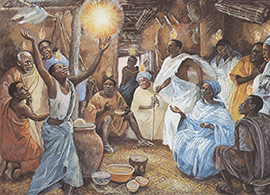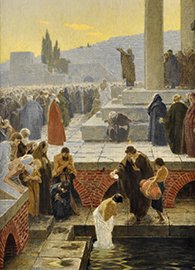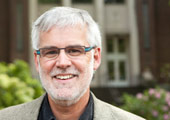Acts Week 2
Thrill Ride: Acts 1–2
By Jack Levison
W. J. A. Power Professor of Old Testament and Biblical Hebrew, Southern Methodist University
Read this week’s Scripture: Acts 1-2
16:54

 Enlarge
Enlarge
Whenever you read the word Pentecost, think rollercoaster. Not a measly little bumpy carnival ride, but the Ride of Steel at Six Flags or the legendary Cyclone at Coney Island. Think free-falling, twisting, jostling, lurching, spinning rollercoaster, and you are well underway to getting the gist of the first two chapters of the book of Acts. But I’m getting ahead of myself. Pentecost (remember, think rollercoaster) isn’t just the stomach-clenching first dip. The fun begins long before your heart leaps to your throat in that first free-fall.
Getting Ready
First you have to qualify. For rollercoaster riders, that means standing next to that ugly little wooden character who’s 54 inches tall or so. For the people of Pentecost, that meant finding a qualified apostle to replace Judas Iscariot. Luke begins the book of Acts by telling us that Jesus ascended “after giving instructions through the Holy Spirit to the apostles whom he had chosen” (Acts 1:2). Jesus had to choose his apostles, and they stuck to him like glue, from his baptism to his resurrection. The qualifications for riding were not so much 54 inches of height as 36 or so months of companionship [Author’s Note 1].
Next you have to enter that interminable line, and wait 20, 40, 60, even 90 minutes for a 90-second thrill. Waiting is a key component of the ride — looking ahead with fiercer and fiercer anticipation. Luke begins his gospel with a note of anticipation. Old Simeon, who has remarkable things to say about the baby Jesus, is “looking forward to the consolation of Israel” (Luke 2:25), and the ancient widow Anna talks about Jesus to anyone who is “looking for the redemption of Jerusalem” (2:38).
Luke ends his gospel where it began, with eager waiting:
I am sending upon you what my Father promised; so stay here in the city until you have been clothed with power from on high (Luke 24:49).
Acts begins where Luke’s gospel leaves off. The disciples are ready to ride, and Jesus tells them they “will receive power,” but apparently not yet. So the apostles and women with them do what Simeon and Anna had done: they wait. Not just listlessly. They wait actively, purposefully. Luke writes:
They returned to Jerusalem … went to the room upstairs where they were staying … constantly devoting themselves to prayer (Acts 1:12–14).
Waiting is just plain tough. We talked about this in the introduction with respect to Paul’s endless waiting, as he is passed like a hot potato from one apathetic Roman official to the other. And waiting is perhaps even tougher for us, now that waiting for three or four seconds for a web page to load frustrates us. But waiting is part of the ride, even part of the thrill, and the sooner we recognize this, the better Christians we will be. There is such a thing as disciplined waiting, devoted anticipation, dedicated expectation.
Your next step, when the waiting ends and you’re next in line, is to get yourself ready. You make sure your glasses won’t fall out of your pocket and your wallet or purse is tucked carefully away. You step down into the car, pull the brace over your shoulders or the belt over your lap — and hang on for dear life.
This is all part of the ride — practical matters to get things in order. That’s what Peter does. Judas the betrayer has committed suicide, and Peter knows it’s time to replace him. So they identify people who fit the bill — who were with Jesus from his baptism until his ascension — pray, and cast lots. The last, practical little detail before the rollercoaster takes off is a matter of math: 11 needs to become 12. So Matthias takes his place among the 12 (1:15–26). Details matter.
The Beauty of Free-fall
After a gritty climb comes the first unbearable dip. Despite the fear factor, there is beauty in free-fall, in the fire of inspiration, in the bracing winds of divine presence, in a gut full of the holy spirit [Author’s Note 2]. This is free-fall. And this is what happened in a nondescript and worn section of Los Angeles:
On a foggy evening in the spring of 1906, nine days before the San Francisco earthquake, a small group of black and white saints gathered in a house in a run down section of Los Angeles to seek the baptism in the Holy Spirit. Before the night was over a terrified child ran from the house to tell a neighbor that the people inside had fallen on the floor, shouting strange languages. Several days later the band moved to an abandoned livery stable on Azusa Street where they were discovered by a Los Angeles Times reporter. The “night is made hideous … by the howlings of the worshippers,” he wrote. “The devotees of the weird doctrine practice the most fanatical rites, preach the wildest theories and work themselves into a state of mad excitement [Author’s Note 3].”
Free-fall. Ecstasy. The birth of Pentecostalism — the devotees of Pentecost — which has ballooned into a movement with nearly a billion believers worldwide.
Yet not free-fall, not exactly. Rollercoaster riders know that the headlong dip, the twisting and turning and topsy-turvy movements, are only the sensation of free-fall. The rollercoaster is the work of genius, of meticulous engineering that is as restrained as it is uninhibited in its movements. It’s this tension between flinging the cars this way and that, and holding them in place, that makes the ride so spectacular. Energy — seemingly pure energy — harnessed, perfectly controlled.
That is the miracle of Pentecost: ecstasy and restraint in perfect proportion. On the one hand, anyone can fall headlong into ecstasy or appear drunk — what some in the crowd accused the followers of Jesus of being (Acts 2:13–15). Just watch people stagger and sway as they toddle away from a fierce and furious rollercoaster. On the other hand, anyone can be spiritually in control. Just watch people who don’t have the nerve to get on the rollercoaster. But to be both together — that is the magnificence of Pentecost: the holy spirit flings us simultaneously into apparent ecstasy while leading us into perfect, sublime control.
The single word “other” in Acts 2:4 tells us this: “All of them were filled with the Holy Spirit and began to speak in other languages, as the Spirit gave them to utter.” Rather than saying Jesus’ followers “spoke in tongues,” Luke says that they “spoke in other tongues.” Real languages. Known dialects. And those tongues had content, too: the praiseworthy acts of God [Author’s Note 4].
The amazing ability of the onlookers to hear God’s praiseworthy acts tells us something about ecstasy: its purpose is to communicate the work of God with complete and utter clarity, even miraculous clarity [Author’s Note 5]. There is no ecstasy for ecstasy’s sake. The purpose of ecstasy is to communicate a clear and comprehensible word that recounts God’s praiseworthy acts.
Utter abandon and utter clarity. What a thrill, what a ride, to feel God so deeply and to communicate the truth so cogently!

 Enlarge
Enlarge
The Great Equalizer
Nowadays, fast and furious rollercoasters have a camera that photographs us as we take their dips and turns at full force. Kids love this because their beefy dads are wide-eyed, open-mouthed, and white-knuckled. Rollercoasters are great equalizers. Boyfriends, husbands, and dads are just as terrified as girlfriends, wives, and daughters.
Pentecost was the great equalizer, too. Peter recognized this right away. He could have quoted dozens of other scriptural texts about the outpouring of the spirit or the onrush of the spirit or the resting of the spirit — all of them powerful images of renewal and liberation and leadership. Yet Peter picks this one, from an obscure prophet whose predictions for the most part are fairly pedestrian — except for this thunderbolt:
In the last days it will be, God declares,
that I will pour out my Spirit upon all flesh,
and your sons and your daughters shall prophesy,
and your young men shall see visions,
and your old men shall dream dreams.
Even upon my slaves, both men and women,
in those days I will pour out my Spirit;
And they shall prophesy (Acts 2:17–19, quoting Joel 2:28–29).
Very little of this actually happens in the book of Acts. The only daughters who prophesy are Philip’s; four in number, they have the gift of prophecy (Acts 21:9). The only inspired slave is a girl with a snake-spirit — not the holy spirit — which Paul tells to get out of her because the girl’s constant screaming annoys him (Acts 16:16–18). The only significant visions belong to leading, established men like Paul, Peter, and Cornelius.
Yet this is the church’s manifesto, its birthright, its destiny. The spirit digs deep and turns the soil of society upside down. The spirit is poured out, not surprisingly, on old and young men, sons, too. But it is also poured out, amazingly, on daughters and slaves, both male and female. Anyone, anyone at all, top to bottom, east to west, male to female, can receive the spirit and prophesy. The spirit is not packaged neatly for the pious or privileged — the spirit is outpoured, indiscriminately.
This vision tears the wineskin of conservatism — as we would expect the spirit to do. The inclusion of slaves devastates the rule of order. The inclusion of women, of daughters and female slaves, obliterates the rule of men. The powers-that-be explode at Pentecost, in which the spirit is poured out on all flesh, and no less richly on female slaves than on powerful men.
The explosive energy of Pentecost has taken root down the centuries among Christians who believe that women have the right to preach. The mid-19th-century renowned Methodist preacher Phoebe Palmer, for example, insisted that the “promise of the Father,” Jesus’ reference to the holy spirit (Luke 24:49), gifted women with the power to proclaim Jesus Christ [Author’s Note 6]. She, like many before and after her, saw this promise fulfilled by the events of Pentecost:
God has, in all ages of the Church, called some of his handmaids to eminent publicity and usefulness; and when the residue of the Spirit is poured out, and the millennium glory ushered in, the prophecy of Joel being fully accomplished in all its glory, then, probably, there be such a sweet blending into one spirit … that the wonder will then be, that the exertions of pious females to bring souls to Christ should ever have been opposed or obstructed [Author’s Note 7].
The holy spirit, according to the story of Pentecost, like a fierce rollercoaster, is a great equalizer. Men do not possess the ability to speak in other languages to any greater extent than do women. Owners do not have a greater capacity to proclaim the praiseworthy acts of God than do their slaves. Parents have no more aptitude in prophecy than do their sons and daughters. Just ask Philip, whose four daughters prophesied (Acts 21:8–9). Like father, like daughters.
The End of the Line
You can’t stay on the high of a rollercoaster — or Pentecost — forever. I know this from experience. When my daughter turned 13, we visited Busch Gardens during the off-season, so the place was dead. Chloe and I rode rollercoaster after rollercoaster, dozens of times, without ever getting off. It was thrilling. When I returned to Seattle, however, I couldn’t lift my left leg. Not a bit. So I rolled out of bed, headed to the chiropractor and, a week later, to Harborview Medical Center to get a cortisone shot for a herniated disc. You just can’t stay on a rollercoaster that long. You need to get off, settle down, and get on with life.
But how to adjust to a world without the thrill of rollercoasters? How to settle into life after Pentecost? That important lesson will have to wait until next week.
Questions for Further Reflection
- There is a lot that takes place in Acts 1–2 (the Ascension of Christ, the gathering of the new believers, the replacement of Judas, and Pentecost). What stands out to you from your reading, and why? What do you still have questions about in these two chapters?
- After Jesus’ Ascension the text says a group of believers gathered to wait and pray for the Spirit (tradition tells us they waited for 50 days). Dr. Levison calls attention to this disciplined and intentional waiting. Have you experienced anything similar in your spiritual life? If so, what was it like? What value is there to such a season of waiting?
- What does Dr. Levison identify as the miracle of Pentecost? (Hint: Check out the fourth paragraph under “The Beauty of Free-fall.”) Why is this a miracle, and what does it teach us about God?
- Re-read Acts 2:14–21. Why does Peter quote this text after what they experienced? What does Dr. Levison say about its implications for how the church is shaped?
- Spend some time in prayer, asking God for fresh vision on what it means for you to live in the legacy of Pentecost today.
<<Previous Lectio Back to Acts Next Lectio>>

This work is licensed under a Creative Commons License.





“I tend not to capitalize holy spirit”
not sure why one wouldn’t want to honor God even in this way- don’t have access to this reference to see.
Thank you for the series, looking forward to the rest of it.
make disciples in the name of the Father, Son, Holy Spirit Matt 28:19
Hello-
Thanks so much for your comment and question– it is a good one! Due to space constraints in the Lectio Dr. Levison couldn’t address this issue at length. If you are able, we’d recommend checking out his book, Fresh Air, which provides an in-depth explanation for this decision. It certainly is not meant as any disrespect to the Trinity.
Blessings as you study God’s Word!
Sometimes I long for the breathlessness of the workings and Resurrection power of the Holy Spirit but I know we cannot live there for all time, much like that wild roller coaster ride. But, the apathy and lifeless attitude of most churches today (at least the ones I seem to attend) could be so invigorated by the breath of God–the Holy Spirit-if only they were not so fearful and resistant to invite Him in.
I’m ready for more….